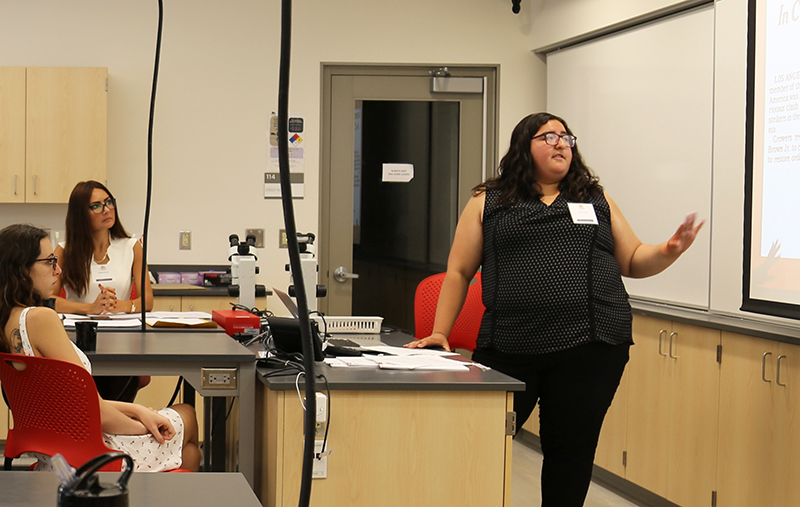At Whittier College, education goes beyond the confines of campus. Here, we know that classroom learning needs to be practically applied both for career training as well as civic involvement, and so getting out into the community is crucial for intellectual and character growth.
Internships
Whittier's location in Southern California, close to Los Angeles and Orange County, gives students internship opportunities that will help them gain crucial business training and experience valuable for their post-Whittier lives.
Industries ranging from entertainment to finance, aerospace to bioengineering, and more all call Southern California home. Merrill Lynch and First Heritage Bank, Sony Pictures and New Line Cinema, EMI Music Publishing, the J. Paul Getty Museum, A.B.S. Designs by Allen Schwartz, Southern California Edison, and Valvoline are just some of the places that our students have interned. Whittier students often travel further afield as they gain invaluable work experience, whether interning at the Department of Education in Washington, D.C., the United Nations in Geneva, or the Steppenwolf Theatre in Chicago.
Civic involvement is immensely important at Whittier College as well. Our Center for Engagement with Communities brings together faculty, students, and staff from all sectors of the College to partner with non-profit organizations and local government in Whittier and the neighboring communities.
Learn more about the internship process at the Weingart Center for Career and Professional Development. And to locate volunteer opportunities in and around Whittier College, please visit the Center for Engagement with Communities.
Preceptorships
All History majors complete either an internship or a preceptorship while at Whittier. A preceptorship is for those students who intend to go into school teaching or who intend to pursue and advanced degree in history. Over the course of a semester, a student preceptor works with a member of the history department about how to develop and organize a history course, to design a class meeting, and to teach a class module.
Fellowships
Each year, Whittier students compete for and win scholarship and fellowship awards that help them attain financial support to actualize their college and post-college plans – whether those plans involve graduate school, international research, public service, or other career aspirations.
Whittier graduates have earned Rhodes Scholarships, Thomas R. Pickering Foreign Affairs Fellowships, and several have become Fulbright awardees.
The Fellowships office is committed to helping student launch their search for internal, national, and international fellowships that meet their intellectual, professional, and personal goals.
To find fellowships that match your interests, visit the Fellowships website.
 Giving a Voice to the Voiceless
Giving a Voice to the Voiceless
Daniela Vega used her growing research skills to shine a light on stories in her community: specifically, the integral role women have played in labor movement history.
Daniela traveled to the Imperial Valley to collect the oral histories of women who took part in the lettuce strike of 1979. The successful strike serves a case study for Daniela, who hopes to show that Mexican immigrant women actively participated in labor organizing, challenging the gender dynamics of their time.
“Their involvement in the labor movement not only helped their families, it allowed them to feel empowered and part of a broader and bigger issue,” she said.
The Imperial Valley is more than a fascinating research subject for Daniela, who wants to become a professor. It’s also home: her mother picks basil and her father is a foreman for a farming company. She was raised in a community in which hard work and determination were essential, and it’s this community she's returned to for her research. The oral histories are important, as these women’s voices help fill in gaps in a history that doesn’t always offer them a place.
“A lot of the time, farm workers are seen as the victims of the agricultural system and they emerge as faceless, powerless, passive, and ultimately outside the flow of history,” Daniela said. “Oral history allows them to bring their own narratives into work. So as a historian, conducting an oral history on labor through a woman’s lens and researching the labor force in the Imperial Valley, I hope to fill in gaps in both labor and women’s studies.”
Despite the amount of information about Mexicans in the agricultural workforce, the involvement of women is typically overshadowed, she added.
“All of their contrasting roles were vital in this social movement, so agricultural social movements would not have had the same impact without the involvement of women,” Daniela said. “The gender divisions in labor unions and society make it difficult for women to be recognized for their contributions because they tend to be invisible. But without them, these rights would not have been possible.”
Vega’s research is supported by the Mellon Mays Undergraduate Fellowship, which funds underrepresented students’ research with the hope that they will become professors.